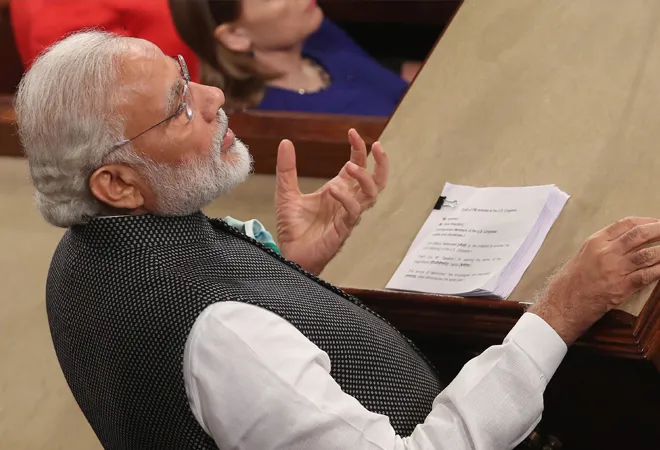-
CENTRES
Progammes & Centres
Location
Economic revival alone can result in a sustained growth.

After a massive majority in the Lok Sabha polls — winning 303 seats for his own party and taking the NDA total to 350 — Prime Minister Narendra Modi has a big task on his hands, that is, meeting the challenges of rising popular expectations.
With a close to two-third majority in the people’s house and an imminent majority in the Rajya Sabha, the Modi 2.0 government has no excuse left for not delivering on promises made by the party and to further take the country to new heights of glory and development.
It must be said that even the Prime Minister is conscious of this fact. After being elected as the leader of the NDA and being appointed by President Ramnath Kovind as the prime minister-elect, the Prime Minister asserted that “the government shall work towards achieving their goals.. Sabka Sath, Sabka Vikas aur Sabka Vishwas is a mantra that shows the path of development for every region of India.”
An aspect of Modi’s first speech after being elected which needs to be underscored is his reference to regional aspirations and his promise of non-discrimination against those who had not voted for the BJP-led NDA. “Ab hamara koi paraya nahin ho sakta. Jo vote dete hain, voh bhi hamare hain, jo hamara ghor virodh karte hain, voh bhi hamare hain,” he reminded the NDA MPs.
While there are serious challenges before the country, both on the domestic as well as on the external front, Modi’s new government would have to take urgent steps to restore the economic growth that has been going down for the last couple of years.
The first budget of the new government is to be presented in the Lok Sabha on 5 July by the newly appointed Finance Minister Nirmala Sitharaman which would give clues to whether a sincere attempt has been made to put the economy back on the rails of growth and development.
Unemployment is a real challenge. One can understand that the government was not ready to accept figures of joblessness during the election campaign, but now it is time to accept the unpleasant facts. Unless the problem is identified, its rectification can never take place — this is the determining maxim of governance.
The Union budget therefore would need to focus on reviving the manufacturing sector without whose revival jobs can never be created, particularly at a time, when more and more young people are entering the job market. The budget needs to take into account the factor of youth dividend while preparing the policy framework.
Another sector that need attention is the country’s exports. The US’ decision to stop special duty benefits to Indian goods is a serious setback at a time when the country’s GDP is at the lowest in the last five years. US President Donald Trump had delayed withdrawing GSP (Generalised System of Preferences) until the elections results, so as to not affect the outcome but now that he has made the decision it is going to adversely affect the Indian exports to the US. The GSP scheme provides preferential duty-free access for over $6 billion worth of products exported to the US.
Non-performing loans are a drag on the economy and the Finance Minister cannot escape this issue. Similarly, agricultural distress is yet another area of concern that needs to be addressed. Rural economy needs to be bolstered because real growth potential lies there. Consumption is the key to the revival of industries and manufacturing sectors. Private investments have been slowing down and the budget would need to send positive signals to bring them back.
Economic revival alone can result in a sustained growth without which an upliftment of the poor and the oppressed, including the minorities is impossible. Massive resources are required to be invested in health, education and skill development sectors. Housing for all also requires resources and unless governmental revenues go up substantially, it is impossible to achieve set targets like that of delivery of piped water to all, as promised in the BJP manifesto.
Apart from the immediate and most urgent task of revival of economy, communal amity and social peace are two areas which the central government and state government, irrespective of their ideological inclinations need to ensure, without which progress and development cannot be sustained.
Though the Prime Minister has cautioned his party leaders and newly elected legislators against speaking irresponsibly and to show restraint in their respective statements, it remains to be seen what action would follow against those who do not follow his sane counsel.
Modi was very clear when he said “those who voted for and those who have opposed us vehemently are both ours” advising his colleagues that “we have to work for those who supported us and also those who did not in these elections with the same spirit.”
In a determined attempt to instill confidence, the Prime Minister said that his first term was an attempt to drive a dent into the miasma of poverty and in this term, he wanted the NDA not only to work on those lines but also to shatter the illusion of fear that had been built around minorities in this country.
Modi’s words, hopefully, carry conviction and shall be acted upon with concrete steps. If he can indeed walk his talk, history awaits him, to accord a place that no other leader in independent India has ever got. Opportunity invites him and all he needs to do is to stoop to seize it.
The views expressed above belong to the author(s). ORF research and analyses now available on Telegram! Click here to access our curated content — blogs, longforms and interviews.

Satish Misra was Senior Fellow at ORF. He has been a journalist for many years. He has a PhD in International Affairs from Humboldt University ...
Read More +